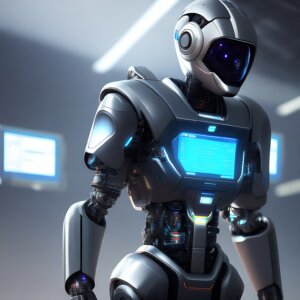 With the rapid emergence of AI technology the threat of AI job replacement is becoming a major concern for workers across many industries. According to a recent Goldman Sachs AI jobs report, generative AI has the potential to impact over 300 million jobs worldwide. This means that many workers may face displacement and job loss as their roles are automated by AI.
With the rapid emergence of AI technology the threat of AI job replacement is becoming a major concern for workers across many industries. According to a recent Goldman Sachs AI jobs report, generative AI has the potential to impact over 300 million jobs worldwide. This means that many workers may face displacement and job loss as their roles are automated by AI.
Is the AI job replacement threat real or just part of the irrational hysteria surrounding artificial intelligence? We dive into the details below and look at which jobs could be at risk, which ones are likely safe, and what you can do to protect yourself.
What Types of Jobs Are at Risk?
There’s no question generative AI tools have the potential to replace many jobs in industries ranging from manufacturing to customer service. Based on current trends here’s out take on the top five types of jobs that could be replaced by generative AI in the next decade:
- Data Entry Clerks – Data entry is a repetitive task that involves inputting data into a system. This is a task where AI can easily replace humans. AI systems can process large amounts of data at a faster rate and with greater accuracy.
- Telemarketers – Telemarketing is a job that involves calling potential customers to sell products or services. AI tools and chatbots can be programmed to make these calls, eliminating the need for human telemarketers. See our overview of AI Marketing tools to learn more.
- Bookkeepers – Bookkeeping is a job that involves recording financial transactions. AI systems can be used to automate this process. We expect many entry level financial jobs to change or become obsolete over the next decade.
- Assembly Line Workers – Assembly line work involves repetitive tasks such as putting parts together or packaging products. This is an area where AI can easily replace human workers, as robots can perform these tasks with greater efficiency.
- Customer Service Representatives – Customer service is a job that involves answering questions and resolving issues for customers. AI systems and chatbots can be programmed to handle these tasks, eliminating the need for human customer service representatives. See our summary of AI Chatbots to learn more about this type of AI technology.
What Types of Jobs Are Safe From Generative AI?
Some jobs are less likely to be impacted by the arrival of AI tools and technology. Jobs that require a human touch, such as healthcare and education, are less likely to be replaced by AI. The part that AI tech can’t duplicate or improve is the emotional intelligence and human interaction that both of these roles depend on.
Additionally, jobs that require a high level of creativity and innovation such as art or product design are also less likely to be replaced. These jobs require a level of critical thinking and imagination that AI tools cannot replicate.
What New Jobs Will Be Created by Generative AI?
While generative AI has the potential to replace many jobs, it also has the ability to create many new jobs. One potential new role that may emerge from generative AI is the prompt engineer. A prompt engineer is a person who develops the prompts that AI systems use to generate content. If you’ve ever tried entering a complicated prompt into ChatGPT or an AI Image Generator App you can appreciate how difficult it is to build precise prompts.
As AI systems become more advanced, the need for prompt engineers will grow. These professionals will play a critical role in developing the prompts that AI systems use to generate content. In addition to prompt engineers, other new jobs may emerge in areas such as AI research, development, and implementation.
Another role we expect to emerge is an AI Trainer or Optimizer. As more businesses and organizations begin to adopt generative AI technology, there may be a growing demand for experts who can train and optimize these systems. An AI Trainer would work to improve the accuracy and effectiveness of generative AI models and be responsible for developing and implementing training programs for other employees.
Protecting Yourself From the Impact of Generative AI
As generative AI technology continues to advance and replace certain jobs, it’s important to take proactive steps to protect yourself. Here are a few strategies we suggest:
- Focus on developing skills that are difficult to automate. This might include areas such as creativity, critical thinking, or interpersonal communication.
- Stay up to date on new technologies and trends – By staying informed about the latest developments in generative AI and related technologies, you can position yourself to adapt and respond as needed. This might involve taking courses or attending industry events. For example, reading about the difference between GPT-3 and GPT-4 is a good place to start.
- Consider new career paths or opportunities – In some cases, it may be necessary to consider new career paths or opportunities that are less likely to be impacted by generative AI. This might involve transitioning to a new industry, starting your own business, or pursuing additional education or training.
Conclusion
If the fast pace of Generative AI improvements continues we expect AI job replacement to impact millions of jobs worldwide. It is important for workers to understand the potential impact of AI job replacement and start planning for the future. The best course of action is to protect yourself by learning about AI advancements, getting trained on how to use Generative AI Apps, and considering new roles and jobs that are created in the next decade.
